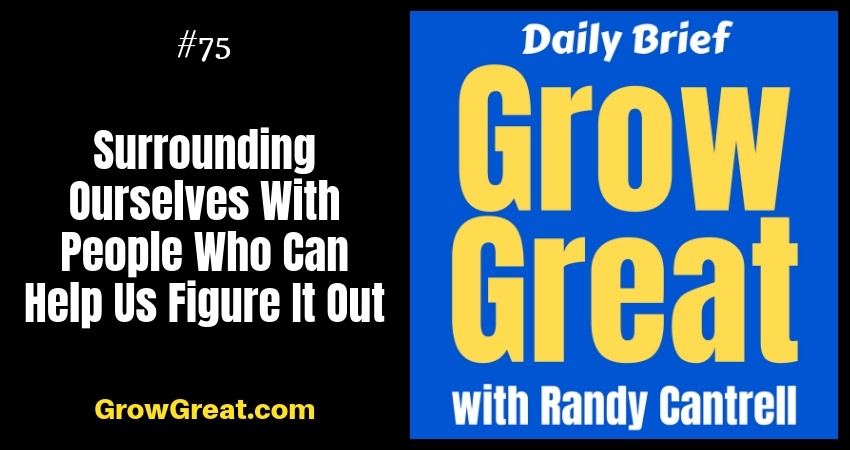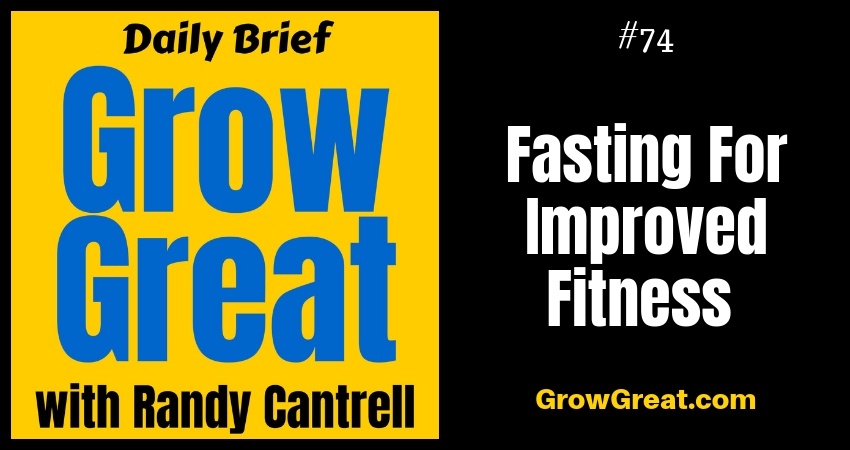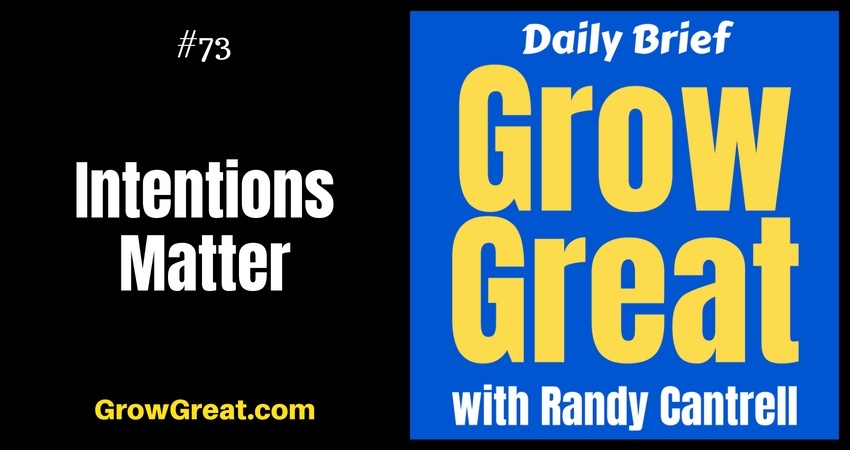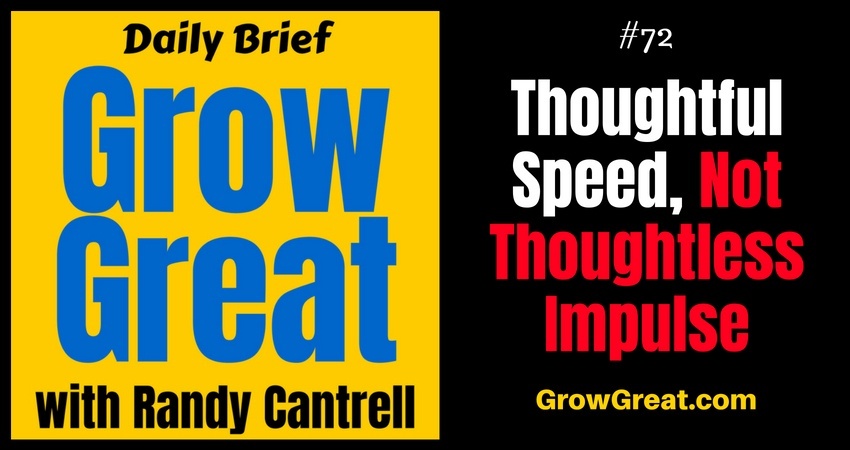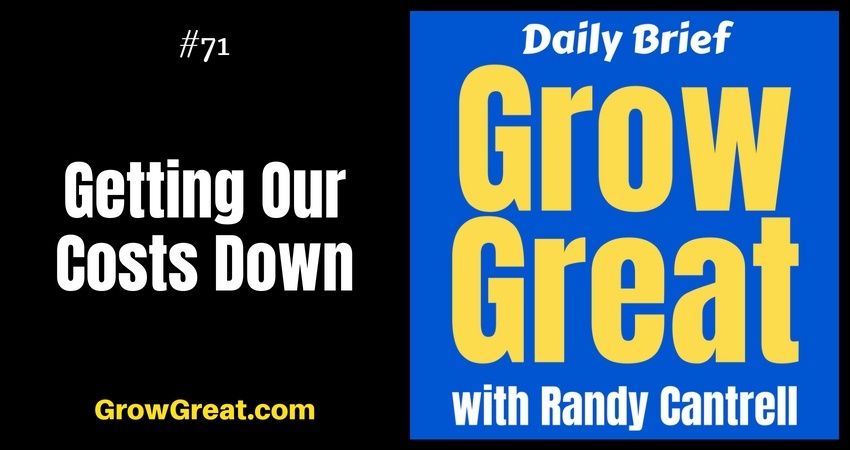Fake Is Fun, But Fatal – Grow Great Daily Brief #76 – October 5, 2018
Podcast: Play in new window | Download (Duration: 14:17 — 13.6MB)
Subscribe: Apple Podcasts | Spotify | RSS | More
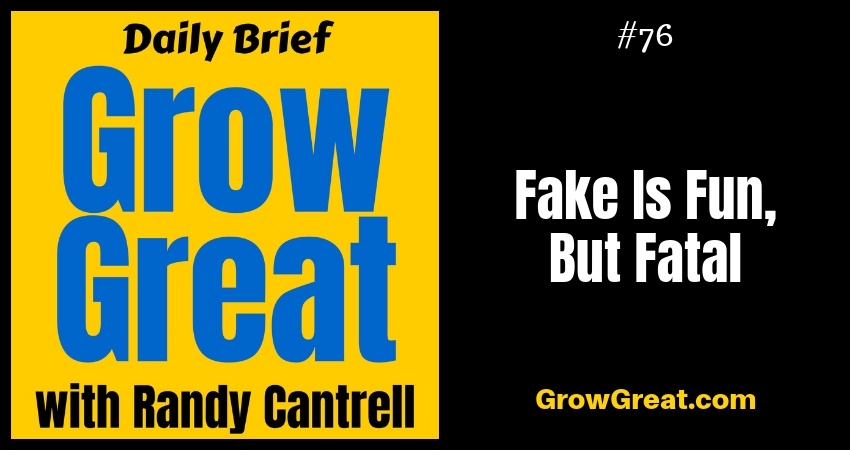
Acting & Feeling Your Age/Experience
I don’t feel much different than I did when I was a teenager. Kids don’t realize that in 20 years they’re not going to feel much different. And today, a 40-year-old or 60-year-old doesn’t look remotely like they did when I was a kid. Google pictures of the 1960’s compared to a picture of today. You’ll notice the differences.
Is it culture? Modern health practices? Modern medicine? All of that, and more? Yes.
I grew up hearing older folks tell us, as kids, to act our age. Of course, when you’re 16 you feel and think you’re acting like a 16-year-old. Honestly, you likely are acting your age. The older people want you to act older, which means they want you to act like you’ve got way more experience, wisdom, and thoughtfulness than exists in your life.
Fake is fun, but it’s fatal.
I’m mature. I’m not old. I’m at my best right now…at this moment.
I’ve got decades of real-world operating businesses experience and know-how, the stuff you can’t learn any other way than by doing it.
I’ve got decades of wisdom that I didn’t have earlier, but I’m still driven by the curiosity of the things I know I need to still learn.
I’m not alone. Draw a timeline that can represent a lifetime. Make marks at 18, 24, 30, 36…and on. Every mark, every age, and experience brings value. My current value is what it is. But it’s not like my value just kicked in.
Age and experience are realities that too many people get messed up on. Young people want to be older. Older people want to be younger. Both sometimes want to act the opposite of what they are. Or where they are.
It’s why there’s so much fakery. We wrongly think we can fool people. Forget it. Even if you do fool people, remember you’ve only fooled the fools.
Owning your present reality isn’t a cop-out. It doesn’t mean you don’t grow, feed your curiosities, or devote yourself fully to the mountain climb! Fact is, that’s exactly what it does mean. You do all that and more. You create, innovate, disrupt and learn — all aimed at your own life first.
What you’ve figured out is important. What you haven’t figured out may be more important. At the heart of it all is figuring out YOU. I’m focusing on this as I return from being dormant for about a month because I continue to see people posing as something they’re genuinely not. From executives seeking new opportunities, to leaders who are finding it difficult to mimic somebody they admire, to business owners who feel the urge to jump on every latest technical tactic or strategy, even the ones they’ve not spent enough time to fully understand. It’s a big game of people grasping at straws. And it makes no sense to me.
Plus, there’s a ton of people looking for positive reinforcement for every dumb idea they’ve got. The lack of candor and accountability is the death of too many already.
So people puff up to inflate themselves, like puffer fish trying to scare off predators. Pretending to be better, bigger, more sophisticated, more successful than they really are. It’s an addiction that will end poorly, but in the short-term, it feels great. We’re deluded. Not thinking clearly.
Reality is the recipe, the counter punch needed.
Feeling good in the short-term produces long-term pain and guilt. Scan the Wall Street Journal, randomly looking at companies reporting performance. If the results are positive, you’ll hear company officials talk a certain way. But if the results are lackluster, or poor, you’ll get complex language aimed at avoiding responsibility and accountability. The blame game is popular when you want to avoid reality.
What does this mean for you and your business? Or your leadership?
Do what is necessary to get a clear mind. Discover the truth.
We usually know when our vision isn’t quite right because we know what seeing clearly looks like. But it’s possible to ignore the signs and over time we don’t realize just how blind we are. Enter the eye exam or test. It’s a way for us to know – not think, but to really know – that our vision isn’t what it should be. We’re not seeing things clearly.
Our business ownership and leadership need that kind of scrutiny so we know we’re seeing things as they are, not as we hope them to be. You can take a number of actions to help. I’m going to suggest you start communicating with your people. Candor and listening are key. Be frank in communicating what you’re hoping to accomplish – a quest to discover the truth. You want the truth of what’s right, what’s wrong, what needs to be fixed, what needs to be enhanced, what needs to stop…you want the most open dialogue you can foster. That’s going to be hard if you’ve never done it before because people are going to be mistrustful. You’re going to have to prove to everybody how serious you are.
Ask questions, then listen. Don’t prime the pump for the answers you want. You want the truth. You want and need reality. Your leadership, your ownership, and your business will benefit most from the truth, not some fake reality you all wish was true.
Changing the culture to foster truth takes time. Be patient.
This can’t be a one-off. You need to make this how you roll all the time. Once you sense people are trusting enough to divulge the truth, praise it. Act on it. But be patient knowing that if this is going to stick, you’ll have to keep pushing.
Insist on the truth. Show people that the quicker they get to the truth, the better for them, and the entire operation. While speed matters, and I’m fanatical about it when it comes to execution, you have to be patient knowing that if this is brand new inside your business…it’s going to take time for people to continue to embrace this new way.
Challenge your leadership team by not tolerating anything other than brutal honesty. Not brutal in the sense that it’s filled with judgment and finger-pointing. Brutal in the sense that it’s fast and respectfully unfiltered. The word is “thoughtful.” Do not tolerate anything other than thoughtful honesty and discussion about the truth – how things really are.
Disagreement is okay. In fact, it’s good. Leverage it.
Understand that somebody’s truth is somebody else’s fakery. We don’t all see things the same way. We all make judgments. It’s necessary so we can do anything. Discernment, dot-connecting – it’s all part of what we do every day. All of us.
But sometimes we get it wrong. Convinced we had it right until somebody or something shows us we were wrong…we were convinced we were right. How you overcome that?
By sharing experiences and insights.
When somebody reveals a truth, make sure everybody expresses why they believe that to be true. Push and make people defend it. Let others push you to defend what you believe to be true. There has to be a standard by which you’re going to measure truth. And a way for you to get to it. This is it.
Get close to the source. A common problem with leadership is a poor perspective. Their viewpoint is from an angle far removed from the work. Yes, you need that wide-angle view that leadership provides, but you also need to zoom in and get up close to the problem. It’s easy to discount the feedback – the experiences and insights – of the front line workers because leaders tend to look down on them (BIG mistake) and think they know more. The employees doing the work have a viewpoint you must hear! Listen without judgment. Reward candor and honesty. Again, just make sure everybody knows their experiences and insights are valuable but open to honesty challenging. Don’t get defensive, but people have to know excuse-making and griping aren’t the objectives – getting to the truth is what matters. You want to make things better and that can best be done when you know what the problems are. Liken it to a doctor’s visit where you reveal the symptoms, but the doctor has to perform tests to make sure you both know what you’re up against.
If your end of the boat sinks, so does mine.
This is very important. It’s not a zero-sum game. It’s mutually beneficial or mutually detrimental. The company can grow, and the individual inside the organization can grow, too. Expanding the pie, that’s the goal. Impress your company with that goal. Don’t just talk the talk, do it. Daily.
Pronouns matter. Lose “I” and “me” from your vocabulary. Yes, I know you own the joint. So does everybody else. But you don’t have to rub everybody’s nose in it. These people have their lives invested in their work. The company matters to them. They don’t need equity for the company to matter to them.
Embrace “we” and “our” into your daily vocabulary. It’s a powerful way for you to demonstrate the power of “if your end of the boat sinks, so does mine.” As the captain of the boat, do all you can to make sure everybody understands the power of truth to help you steer the boat in the most favorable direction so everybody benefits.
Don’t let anybody fake anything. Keep it all real. Truthful. Fake is deadly. Fatal.
Be well, Do good. Grow great!

Listen to the podcast
Fake Is Fun, But Fatal – Grow Great Daily Brief #76 – October 5, 2018 Read More »


